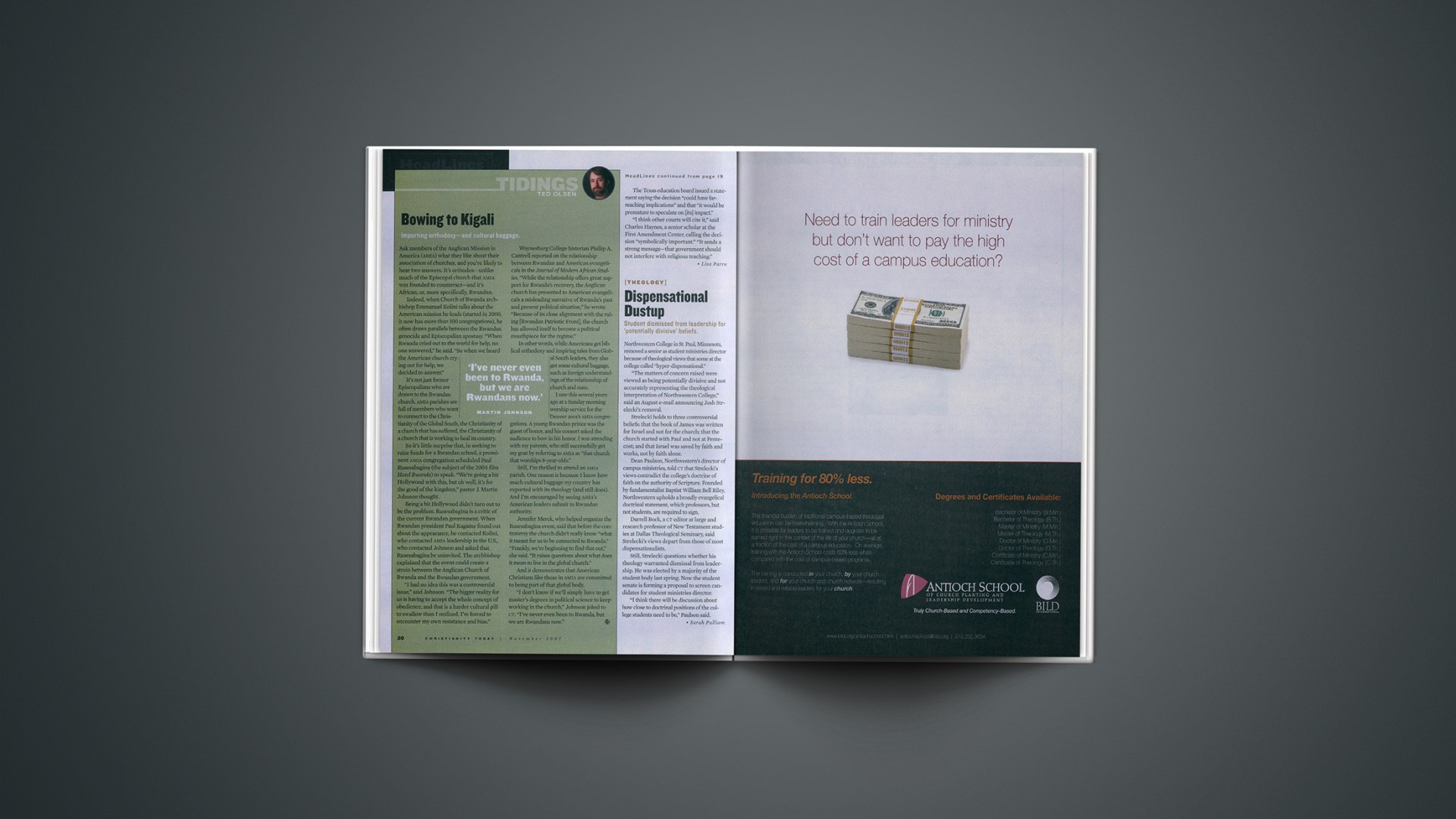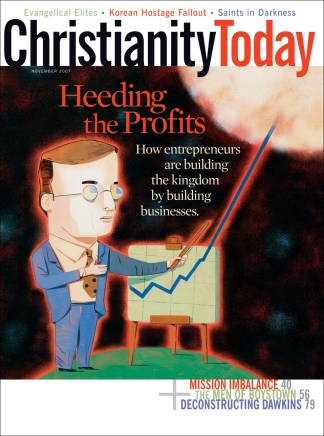Ask members of the Anglican Mission in America (AMIA) what they like about their association of churches, and you’re likely to hear two answers. It’s orthodox—unlike much of the Episcopal church that AMIA was founded to counteract—and it’s African, or, more specifically, Rwandan.
Indeed, when Church of Rwanda archbishop Emmanuel Kolini talks about the American mission he leads (started in 2000, it now has more than 100 congregations), he often draws parallels between the Rwandan genocide and Episcopalian apostasy. “When Rwanda cried out to the world for help, no one answered,” he said. “So when we heard the American church crying out for help, we decided to answer.”
It’s not just former Episcopalians who are drawn to the Rwandan church. AMIA parishes are full of members who want to connect to the Christianity of the Global South, the Christianity of a church that has suffered, the Christianity of a church that is working to heal its country.
So it’s little surprise that, in seeking to raise funds for a Rwandan school, a prominent AMIA congregation scheduled Paul Rusesabagina (the subject of the 2004 film Hotel Rwanda) to speak. “We’re going a bit Hollywood with this, but oh well, it’s for the good of the kingdom,” pastor J. Martin Johnson thought.
Being a bit Hollywood didn’t turn out to be the problem. Rusesabagina is a critic of the current Rwandan government. When Rwandan president Paul Kagame found out about the appearance, he contacted Kolini, who contacted AMIA leadership in the U.S., who contacted Johnson and asked that Rusesabagina be uninvited. The archbishop explained that the event could create a strain between the Anglican Church of Rwanda and the Rwandan government.
“I had no idea this was a controversial issue,” said Johnson. “The bigger reality for us is having to accept the whole concept of obedience, and that is a harder cultural pill to swallow than I realized. I’m forced to encounter my own resistance and bias.”
Waynesburg College historian Phillip A. Cantrell reported on the relationship between Rwandan and American evangelicals in the Journal of Modern African Studies. “While the relationship offers great support for Rwanda’s recovery, the Anglican church has presented to American evangelicals a misleading narrative of Rwanda’s past and present political situation,” he wrote. “Because of its close alignment with the ruling [Rwandan Patriotic Front], the church has allowed itself to become a political mouthpiece for the regime.”
In other words, while Americans get biblical orthodoxy and inspiring tales from Global South leaders, they also get some cultural baggage, such as foreign understandings of the relationship of church and state.
I saw this five years ago at a Sunday morning worship service for the Denver area’s AMIA congregations. A young Ugandan king was the guest of honor, and his consort asked the audience to bow in his honor. I was attending with my parents, who still successfully get my goat by referring to AMIA as “that church that worships 10-year-olds.”
Still, I’m thrilled to attend an AMIA parish. One reason is because I know how much cultural baggage my country has exported with its theology (and still does). And I’m encouraged by seeing AMIA’s American leaders submit to Rwandan authority.
Jennifer Merck, who helped organize the Rusesabagina event, said that before the controversy the church didn’t really know “what it meant for us to be connected to Rwanda.” “Frankly, we’re beginning to find that out,” she said. “It raises questions about what does it mean to live in the global church.”
And it demonstrates that American Christians like those in AMIA are committed to being part of that global body.
“I don’t know if we’ll simply have to get master’s degrees in political science to keep working in the church,” Johnson joked to CT. “I’ve never even been to Rwanda, but we are Rwandans now.”
Copyright © 2007 Christianity Today. Click for reprint information.
Related Elsewhere:
Correction: An earlier version of this article incorrectly reported the nationality of the guest of honor at the joint Denver AMIA service. It was King Oyo Nyibma Kabamba Iguru Rukidi IV of Uganda, who was then age 10. We regret the error.
Our full-coverage section on the widening division in the Anglican Communion includes “Rwandan Politics Intrudes on American Church,” about Kolini’s request that a Chicago area church uninvite Paul Rusesabagina.
Previous Tidings columns include:
The Death of Blogs | Well, some of them, anyway. (September 25, 2007)
Bush’s ‘Theological Perspective’ | U. S. presence in Iraq is ‘allowing for the inevitable to happen.’ (August 28, 2007)
The Freemasonry Threat | Faint echoes remind evangelicals of a nearly forgotten foe. (July 31,2007)
The Quest for the Historical Jerry | You can tell a lot about someone by what he says about Falwell. (June 13, 2007)
Partial Reversal | The Supreme Court’s abortion decision shows that the arguments have changed. (May 14, 2007)










